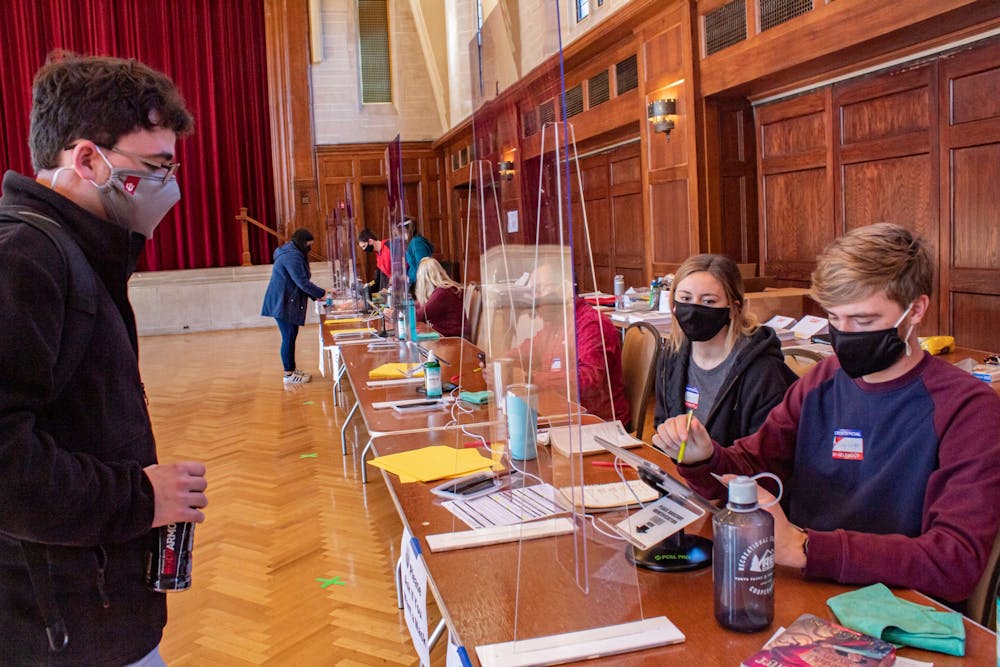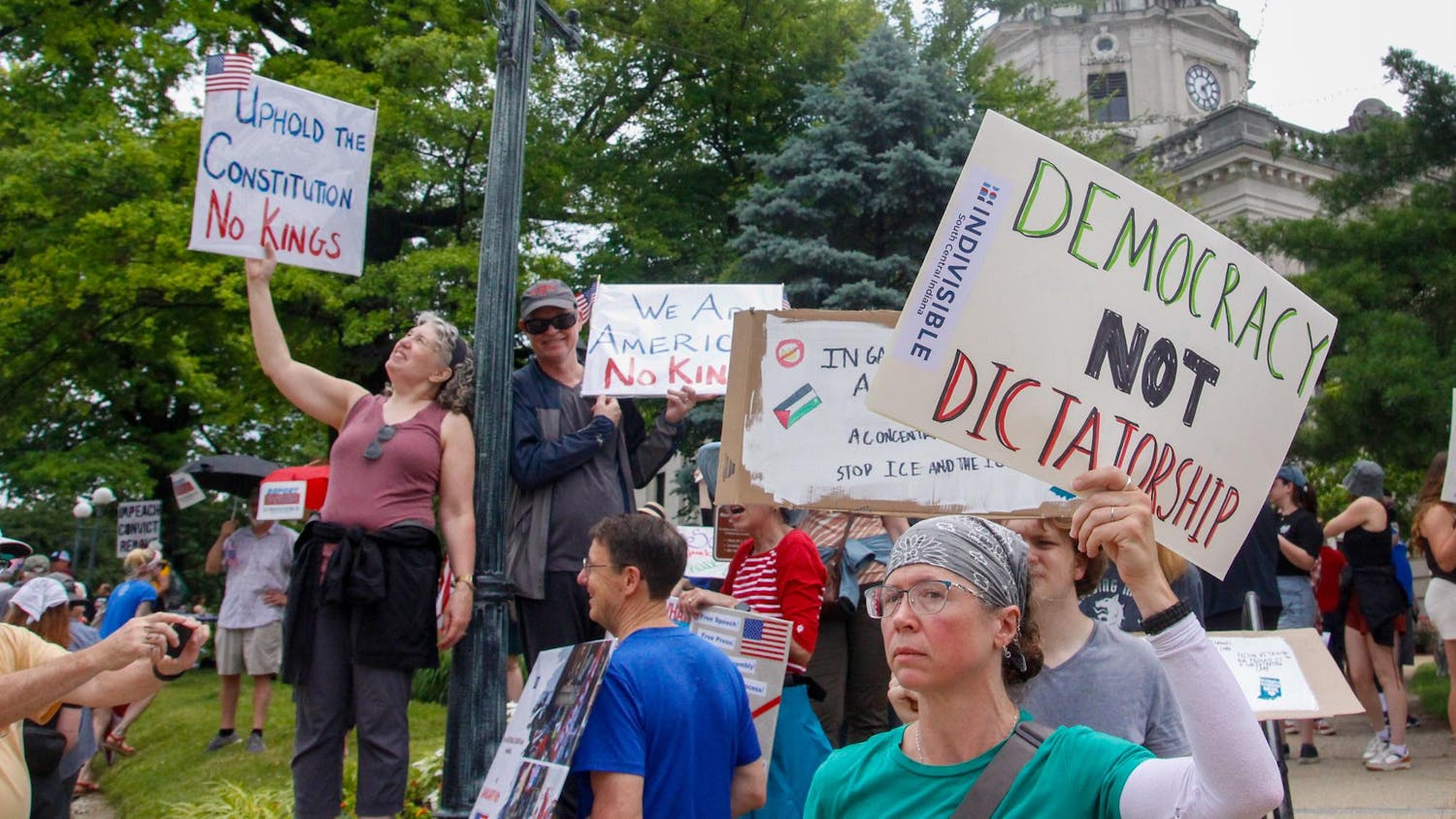Riley Knight did not see the sun on Election Day. He was busy working the polls.
The 21-year-old Champaign, Illinois, native walked into the Indiana Memorial Union at 5 a.m. Tuesday to start his shift. Campus was still dark, and there was still an hour before the polls opened, but a line of students was already waiting. Knight would not emerge again until after the polls closed at 6 p.m.
Knight is part of a wave of young people who decided to offer their time at the polls this year. He believes the future of American democracy is at stake in this election.
Monday, he said he was filled with both excitement and dread. Two hours after the polls closed and the presidential race grew narrower and narrower, it was mostly dread.
As a senior finishing up a policy analysis major, Knight has spent a lot of his time at IU studying the U.S. government and thinking about how democracy works – and how it could work better.
“I really have a lot of faith that our system of government can work as long as people are engaged and people are looking out for the system and do their best to uphold shared democratic values,” he said the day before the election, his voice earnest. “Voting is such an important part of that.”
But the stakes of this election weren’t the main reason Knight spent pre-dawn to post-dusk working the polls.
“I would volunteer to work the polls regardless,” he said. “I just like being a part of the process, and I like being able to help other people vote.”
And what better way could there be to pass the time waiting to see if American democracy would survive the night?
“I always get super stressed on Election Day,” he said. “I figured the best place to be is helping other people vote and being part of the process.”
This was Knight’s second time as a poll worker. His first was in 2018, at a retirement home. But 2020 felt different — and not just because of the masks. The voter demographic of his polling place was much different since the IMU drew mostly students. As voters filed in, people from the Big Ten voter challenge waited right outside the poll lines, handing out snacks and water.
The 2016 election was a major reason Knight is passionate about politics and governance. He was a senior in high school during that election. Up until then, he had just listened to his parents’ political beliefs. But watching that campaign season — especially the conduct of then-candidate Trump — made him realize he wasn’t a Republican.
By election night 2016, Knight was a strong Hillary Clinton supporter. He was devastated when President Donald Trump won, and he said his political convictions have solidified during college.
On Tuesday, Knight scanned each voter’s identification with an iPad, making sure they were registered to vote and at the right polling place. He and another poll worker signed the ballots. Then the election judges signed off.
The voters then filled out their ballots, put them in the machine, and got their “I Voted!” stickers.
“It’s tiring and it’s hard, but it’s worth it,” Knight said, describing the process he repeated more than 100 times during the 12 hours the polls were open. “But the results, I’m not sure I’m ready to see,” he said.
Although he enjoyed working the polls, there were moments that left him frustrated. After the initial line when the polls opened, turnout was underwhelming, he said. A slow trickle of voters filed in all day.
This was the case across the county, likely due to the number of polling places, 28, and high turnout for early voting.
Most frustrating of all, Knight said, he had to turn away a few dozen voters on technicalities. No Indiana photo ID. Wrong polling location. Out-of-date voter registration.
The frustration in Knight’s voice was clear as he talked about the hoops Indiana’s laws make voters jump through.
He said he issued 30 or 40 provisional ballots, which are used when there are questions about a voter’s eligibility that have to be resolved before their ballot can be counted. Knight didn’t think the votes from the provisional ballots he handed out would be counted since they’re counted at the county’s discretion.
One of those ballots was issued to a man who found out his Michigan ballot hadn’t made it home in time, Knight said. The provisional ballot was his last shot. Many of the provisional ballots were for people who were unknowingly registered in Marion County.
“It seems like it wouldn’t be that hard for the state to design a way to make sure everyone can vote,” Knight said. “But it seems like state laws are designed to make sure these kinds of situations happen.”
He said many of the voters who were turned away were students and other first-time voters, and he worries the experience will lead to disengagement.
One of the interactions that stuck with him was a woman who had come to the wrong polling place and who only had a Massachusetts driver’s license with her. He asked if she had any other identification. Her expired passport at home was her only hope of voting that day, but Knight wasn’t sure whether she made it in time.
“I had to tell her she needed to go home and to a different polling location,” Knight said. “So I hope she was able to vote.”
When the polls closed at 6 p.m., Knight and other poll workers triple-counted the ballots before the inspector and a judge took them to election central. Then, he was off for the night to watch results roll in on CNN.
With the results of the presidential election still uncertain Wednesday afternoon, Knight felt pessimistic.
“I’m worried about the long-term well-being of real democracy in the U.S.,” he said.
But the process of working the polls and participating in democracy is something that made Tuesday a good day for Knight, even if he is apprehensive about the outcome.




